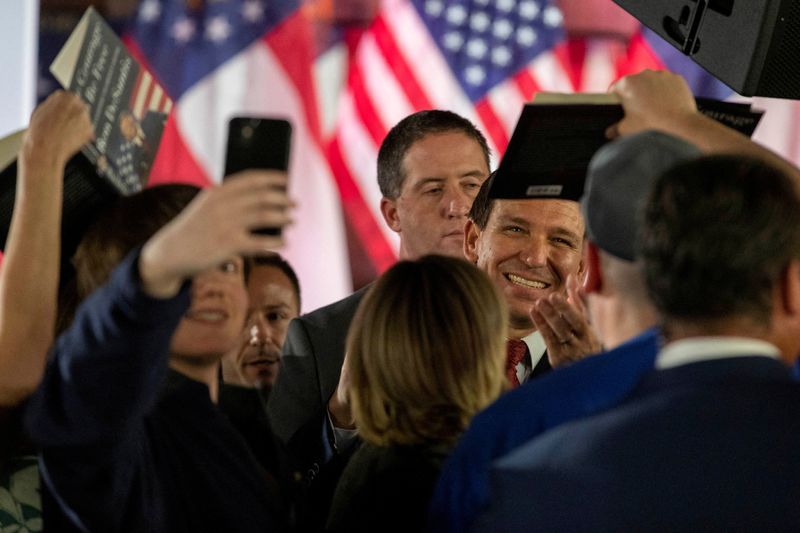In signing 6-week ban, DeSantis wades into thorny debate over abortion and 2024
2023.04.14 20:06

© Reuters. FILE PHOTO: Florida Governor Ron DeSantis interacts with supporters following a book tour visit to Adventure Outdoors gun shop in Smyrna, Georgia, U.S. March 30, 2023. REUTERS/Alyssa Pointer/File Photo
By Joseph Ax
(Reuters) – When Florida Governor Ron DeSantis signed a 15-week abortion ban on April 14, 2022, he held a morning ceremony at a church in front of an enormous “Protect Life” sign, flanked by women and children.
On Thursday, exactly one year later, DeSantis – now a likely 2024 Republican presidential candidate – signed a six-week ban with decidedly less fanfare. The bill signing took place at 10:45 p.m., with no advance notice to the national media.
The stark difference underscored how the politics around abortion have transformed since the U.S. Supreme Court eliminated a nationwide right to abortion in June 2022, a seismic shift that has helped Democrats score a series of electoral victories.
The decision has created a political minefield for Republicans, who must try to strike a balance between appeasing the anti-abortion conservative base without turning off the majority of U.S. voters who oppose an outright ban. Republican presidential hopefuls, including former President Donald Trump, have largely sidestepped the issue.
But that has become increasingly difficult as abortion remains at the forefront of the political world. The issue featured prominently in last week’s state Supreme Court race in Wisconsin and in an ongoing court battle over the legality of a commonly used abortion drug.
A Reuters/Ipsos poll conducted last month showed abortion remains divisive even among Republican voters, with just 54% of Republican respondents saying they would be more likely to support a presidential candidate who backs banning or severely restricting abortion. Nearly four in five Democratic voters, meanwhile, said they would look less favorably upon such a candidate.
The issue could prove especially costly for Republicans among women, who were more likely to oppose restrictions, as well as moderate voters, whose support will be crucial for the 2024 contest. Among poll respondents who identified as independent or merely leaning toward a party, 68% disliked anti-abortion candidates, while 32% favored them.
DeSantis’ backing of a six-week ban – one of the nation’s most restrictive – may help him consolidate support among conservatives but would give Democrats plenty of ammunition for the general election if he wins the Republican nomination.
“The gap between what base voters want and what swing voters will tolerate has gotten very large for Republicans, and abortion is a great example of that,” said Sarah Longwell, a Republican strategist who has conducted numerous voter focus groups.
On Friday morning, less than 12 hours after signing the bill, DeSantis traveled to Liberty University, a conservative Christian school in Virginia. The campus pastor, Jonathan Falwell, praised DeSantis as a champion for unborn babies in his introduction, mentioning the six-week ban to wide applause.
But DeSantis never mentioned the bill in his 19-minute speech, instead simply saying that he had “elevated the importance of family and promoted a culture of life.”
REPUBLICANS TREAD CAREFULLY
Other Republican presidential contenders have also treaded carefully.
South Carolina Senator Tim Scott, who announced a presidential exploratory committee this week, declined to answer directly on Thursday when asked whether he would support a national ban. On Friday, he told NBC News he would back the “most conservative pro-life legislation” that Congress passed, though he would not commit to a specific time frame.
Former South Carolina Governor Nikki Haley, another 2024 candidate, offered little clarity at a campaign event in Iowa this week, saying the issue should be left to the states but also suggesting she might be open to a national ban if a consensus emerged.
Trump, whose appointment of three conservative justices to the Supreme Court led directly to the court’s decision to overturn Roe, has not spent much time taking credit for it.
In a social media post after November’s midterm elections, he blamed the “abortion issue” for the party’s underperformance.
By contrast, former Vice President Mike Pence, a staunch conservative who has hinted at a White House bid, offered unequivocal support for the Florida bill in a Fox News interview on Friday, adding, “I’m pro-life. I don’t apologize for it.”
Democrats have seized on the Republicans’ stances to portray them as out of step with American voters on the issue. The Democratic National Committee issued scathing statements this week attacking DeSantis and Scott on their positions, warning that a Republican administration would push for a national ban.
“Right now, abortion is emerging as a key voting issue in 2024, and that’s a voting issue that is a problem for Republicans,” said Stu Rothenberg, an analyst at the non-partisan newsletter Inside Elections.
Not everyone agrees. In a statement after DeSantis signed the six-week ban, Marjorie Dannenfelser, the president of Susan B. Anthony Pro-Life America, a leading anti-abortion group, noted that he had overwhelmingly won re-election in November while “never flinching in the face of extremist opposition.”
In Wisconsin, abortion was a huge motivator for Democratic voters in the race for a swing seat on the state Supreme Court, said Sam Roecker, a top campaign advisor to liberal Janet Protasiewicz, who easily won the contest.
But he said abortion was only part of their effort to portray her conservative opponent as too far right for the state.
“It’s important to tie this back to an overall theme of extremism that can resonate beyond just those base voters,” he said.








